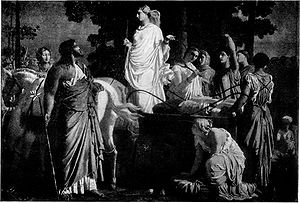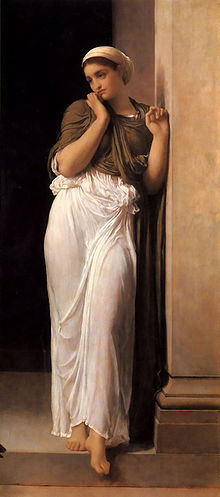- Nausicaa
-
For the film, see Nausicaä of the Valley of the Wind (film). For other uses, see Nausicaa (disambiguation).
Nausicaa (/nɔːˈsɪkiə/; often rendered Nausicaä or Nausikaa; Greek: Ναυσικά/Ναυσικᾶ[1]) is a character in Homer's Odyssey (Odýsseia). She is the daughter of King Alcinous (Alkínoös) and Queen Arete of Phaeacia. Her name, in Greek, means "burner of ships".
Contents
Role in the Odyssey
In Book Six of the Odyssey, Odysseus is shipwrecked on the coast of the island of Scheria. Nausicaa and her handmaidens go to the sea-shore to wash clothes. Odysseus emerges, after being awoken by their games, from the forest completely naked, scaring the servants away, and begs Nausicaa for aid. Nausicaa gives Odysseus some of the laundry to wear, and takes him to the edge of the town. Realizing that Odysseus being seen with her might cause rumors, she and the servants go ahead into town. But first she advises Odysseus to go directly to Alcinous' house and make his case to Nausicaa's mother, Arete. Arete is known as wiser even than Alcinous, and Alcinous trusts her judgments. Odysseus approaches Arete, wins her approval, and is received as a guest by Alcinous.[2]
During his stay, Odysseus recounts his adventures to Alcinous and his court. This recounting forms a substantial portion of the Odyssey. Alcinous then generously provides Odysseus with the ships that finally bring him home to Ithaca.
Nausicaa is young and very pretty; Odysseus says that she resembled a goddess, particularly Artemis. Nausicaa is known to have several brothers. According to Aristotle and Dictys of Crete, Nausicaa later married Telemachus, the son of Odysseus, and had a son named Perseptolis or Ptoliporthus.
Homer gives a literary account of love never expressed: while she is presented as a potential love interest to Odysseus – she says to her friend that she would like her husband to be like him, and her father tells Odysseus he would let him marry her – nothing really results between the pair. Nausicaa is also a mother figure for Odysseus; she ensures Odysseus' return home, and thus says "Never forget me, for I gave you life," indicating her status as a "new mother" in Odysseus' rebirth.[3]
Later influence
The 2nd century BC grammarian Agallis attributed the invention of ball games to Nausicaa, most likely because Nausicaa was the first person in literature to be described playing with a ball.[4]
Nausicaa has been occasionally referenced in literature and art. The manga and anime film Nausicaä of the Valley of the Wind, written and directed by Hayao Miyazaki, was indirectly inspired by the character in the Odyssey. Miyazaki read a description of Nausicaa in a Japanese translation of Bernard Evslin's anthology of Greek mythology, which portrayed her as a lover of nature. Miyazaki added other embellishments to fill in the gaps from Homer.
In "The Humor of Homer" in his Selected Essays Samuel Butler concludes that Nausicaa was the real author of the Odyssey, since the laundry scene is more realistic and plausible than many other scenes in the epic. His theory that the Odyssey was written by a woman was further developed in his book "The Authoress of the Odyssey".
Chapter 13 in James Joyce's Ulysses is entitled "Nausicaa" and echoes the story to a degree: the character Gerty McDowell (Nausicaa's analogue) tempts Bloom.
William Faulkner named the cruise ship Nausikaa in his 1927 novel "Mosquitoes."
Robert Graves' 1955 novel Homer's Daughter presents Nausicaa as the author of the Odyssey, which draws on experiences and influences of her own life.
An asteroid discovered in 1879, 192 Nausikaa, is named after her.
The Australian composer Peggy Glanville-Hicks wrote an opera entitled Nausicaa (libretto by Robert Graves) first performed 1961 at the Athens Festival.
In 2010, the band Glass Wave recorded a song entitled "Nausicaa," sung in the voice of the Phaeacian maiden.
Nausicaans are a race of tall, strong, aggressive humanoids in the Star Trek universe.
References
- ^ Homeri Odyssea, book 6, line 17, Georg Olms Verlag 1991, ISBN 3-487-09458-4
- ^ Hamilton, Edith (1999) [1942]. Mythology: Timeless Tales of Gods and Heroes. New York: Grand Central Publishing Hachette Book Group USA.
- ^ Powell, Barry B. Classical Myth. Second ed. With new translations of ancient texts by Herbert M. Howe. Upper Saddle River, New Jersey: Prentice-Hall, Inc., 1998, p. 581.
- ^ Pomeroy, Sarah B. (1990). Women in Hellenistic Egypt: From Alexander to Cleopatra. Detroit: Wayne State University Press. pp. 61. ISBN 0-8143-2230-1. http://books.google.com/books?id=lcH6oWafBq8C&pg=PA61&dq=agallis.
Sources
- Portions of this material originated as excerpts from the public-domain 1848 edition of the Classical Dictionary by John Lemprière.
Characters in the Odyssey Achilles • Aeolus • Agamemnon • Agelaus • Ajax • Alcinous • Amphimedon • Amphinomus • Anticlea • Antinous • Antiphates • Antiphus • Arete • Aretus • Argos • Calypso • Circe • Clytius • Demodocus • Demoptolemus • Deucalion • Dolius • Echephron • Echetus • Elpenor • Eumaeus • Eupeithes • Euryalus • Eurycleia • Eurylochus • Eurymachus • Halitherses • Helen • Idomeneus • Irus • Kikonians • Laërtes • Laodamas • Leodes • Laestrygones • Medon • Melanthius • Melantho • Menelaus • Mentes • Mentor • Nausicaa • Nestor • Odysseus • Peisistratus • Penelope • Perimedes • Phaeacians • Phemius • Philoeteus • Polites • Polydamna • Polyphemus • Scylla and Charybdis • Sirens • Stratichus • Telemachus • Tiresias • Theoclymenus • ThrasymedesCategories:- Characters in the Odyssey
- Greek mythology
- Women in Greek mythology
- Corcyraean mythology
Wikimedia Foundation. 2010.


